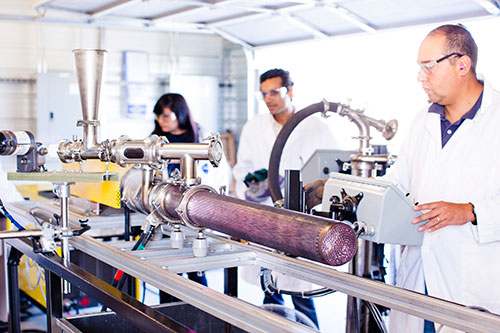 Overview of Mechanical Engineering
Overview of Mechanical Engineering
Mechanical engineers are recruited in a variety of industries, including automotive, aerospace, power generation, environmental, electronics, bioengineering, food processing and consulting firms, among many others. Because of the variety of fields that are relevant to this profession, the undergraduate program covers areas in dynamics, materials, thermal/fluids, vibrations, controls, computer aided engineering, design and manufacturing. The innovative curriculum at UC Merced provides hands-on education that exposes students to engineering fundamentals, laboratory work and the use of computational tools to solve realistic engineering problems. The program also prepares students to pursue graduate work in engineering or other disciplines. Mechanical Engineering is an evolving discipline that adapts to the current needs of society. Some of the exciting current areas of research include advanced energy systems, sustainable energy, autonomous vehicles, biomechanics and biosensors, nano/micro-technology, computational modeling, design optimization and complex systems.
The Mechanical Engineering program at UC Merced is accredited by the Engineering Accreditation Commission of ABET, http://www.ABET.org.
Areas of Research
- Advanced energy systems, sustainable energy
- Autonomous vehicles
- Biomechanics and biosensors
 Careers
Careers
- Aerospace engineer
- Fluid dynamics engineer
- Materials science consultant
- Robotics engineer
- Thermodynamics and heat transfer expert
- Automotive engineer
- Nuclear engineer
- Energy conservation engineer
- Acoustics engineer
* Please Note: Some of these carers might require education beyond a Bachelor's degree.
Learning Outcomes
Students graduating from the Mechanical Engineering program demonstrate the following:
- An ability to identify, formulate, and solve engineering problems by applying principles of engineering, science, and mathematics.
- An ability to apply both analysis and synthesis in the engineering design process, resulting in designs that meet desired needs.
- An ability to develop and conduct appropriate experimentation, analyze and interpret data, and use engineering judgment to draw conclusions.
- An ability to communicate effectively with a range of audiences.
- An ability to recognize ethical and professional responsibilities in engineering situations and make informed judgments, which must consider the impact of engineering solutions in global, economic, environmental, and societal contexts.
- An ability to recognize the ongoing need for additional knowledge and locate, evaluate, integrate, and apply this knowledge appropriately.
- An ability to function effectively on teams that establish goals, plan tasks, meet deadlines, and analyze risk and uncertainty.
More Information about Mechanical Engineering
- Degree Requirement: Mechanical Engineering, B.S.
- School of Engineering
- Staff & Faculty
- Brochure, School of Engineering (pdf)

